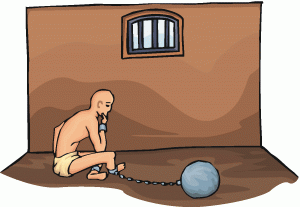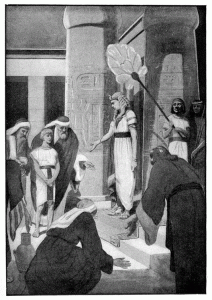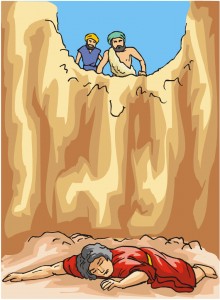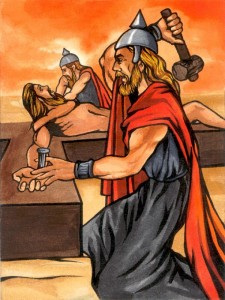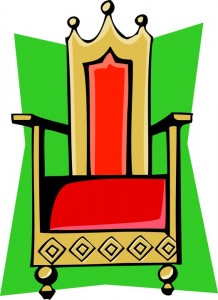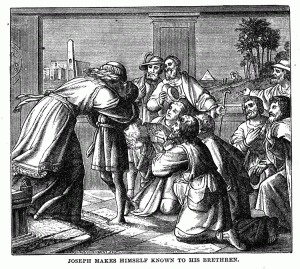This video discusses the prophetic implications of Genesis 44:18 and Judah presenting himself to Joseph and how this is a prophetic picture of Yeshua the Messiah, the Suffering Servant as opposed to the Conquering King.
Tag Archives: Joseph
Don’t Ever, Ever, Ever Lose Faith and Give Up!
Genesis 45:5, 7, 8, Elohim sent me. Joseph was sold into slavery at age 17, was freed from prison and made ruler of Egypt at age 30, then seven years of plenty followed, and two years of famine had passed by the time he was reunited with is brothers. Only after 22 years in Egypt did Joseph finally figure out Elohim’s grand and wonderful plan for his life, and how it involved the saving of his family.
Had Joseph lost faith along the way, become embittered over his misfortunes, and turned from Elohim, the nation of Israel may have never been preserved.
Keeping one’s eyes on Elohim, and refusing to lose faith during the dark times can yield some amazingly triumphant outcomes, as we learn from the life of Joseph.
Joseph, Ephraim, Manasseh & Benjamin in End Times Prophecy
Here are a few of my thoughts on who Joseph, Ephraim, Manasseh and Benjamin represent in end times Bible prophecy.
In studying the Jewish sages of old, I am amazed at how prescient they were about end time events. They gained this understanding often as they studied the lives of notable biblical characters.The sages had the strong sense that history would repeat itself— often again and again for the people of Elohim. This they observed in the cyclical patterns of Israel’s own history where YHVH gave them the truth, they remained faithful to it for a while, and turned from it, were punished and then returned to Elohim only to have the cycle repeat itself again and again.
As I have studied their method of predicting the future based on past events in Israel’s history, this has led me to some of my own speculations, which I present to you below.
There is much more to learn on this subject and I try to remain teachable.
Joseph, Ephraim and Manasseh Antetypical of Christianity
Joseph’s wife was the daughter of an Egyptian priest. Jospeh married into the religious system of Egypt. He is a picture of Christian church, which has married itself to Babylon by syncretizing itself with certain pagan traditions and belief systems. Joseph is a picture of the end time lukewarm church. Ephraim and Manasseh were products of the union of Joseph (an Israelite) and Potifera (an Egyptian). Though they were Israelite, they were genetically a mixture of both Israelite and Egyptian blood. In fact, they resembled Egypt so much that Jacob, when blessing them, didn’t even recognize who they were. They were strangers to him. Though they were spiritual mulattos, their spiritual destiny was to identify wholly with their Israelite heritage, which would necessitate their renunciation of their Egyptian ties. In the end times, YHVH is calling Christians to renounce the pagan ties they Continue reading
Joseph’s Life: Prophetically Points to Yeshua, the Suffering Servant
Genesis 37–41 The Life of Joseph—A Foreshadow of Messiah Ben (Son of) Yosef
The spirit of Antimessiah (Antichrist) is on a dramatic rise in this day and age. It is even alive in the Hebrew Roots or Messianic Israel Movement where some are losing their faith in Yeshua. A few are even converting to Rabbinic Judaism, which denies the messiahship and deity of Yeshua and the divine inspiration of the Testimony of Yeshua. Some of the blame for this can be laid at the feet of a few of the modern-day descendants of the non-believing Pharisees (i.e., the Rabbinic Jews) who use clever arguments to beguile unstable and unlearned souls into humanistic reasoning devoid of a living faith in Yeshua the Savior and Redeemer of man. Because of a spiritual blindness that Scripture prophesied would come upon the Jews producing hardness of heart toward Yeshua the Messiah, unbelieving Jews ignore the numerous prophetic shadow-pictures pointing to Yeshua the Messiah contained in their own Tanakh.
May the following study strengthen your faith in Yeshua, in his divine origination in the very heart, mind and essence of Elohim, and in the fact that he was foreordained to come to this earth to reconcile sinful man to his Heavenly Father through his self-sacrifice on the cross. All this was prophesied long ago in the Hebrew Scriptures. The ancient Jewish rabbis speak of a messianic figure coming called Messiah ben Yosef, the Suffering Servant, whose life and ministry would parallel that of Joseph, yet these same rabbis fail to see the connection between Joseph’s life and that of Yeshua. Let’s now chronicle the striking and uncanny parallels between Joseph and Messiah, the son of Joseph, the Suffering Servant (Many of these comparisons come from the book, Gleanings in Genesis, by Arthur W. Pink):
- Joseph had two names: Yoseph (meaning “to add, increase, do again”) and Zaphnath-panaaneah (41:45) (meaning “revealer of secrets”). How do these names point to Yeshua’s mission? To answer this, consider that the sin of the first Adam caused the depopulation of YHVH’s eternal kingdom, while Yeshua, the Second Adam, came to do what in regards to YHVH’s spiritual and eternal kingdom?
- What was Joseph’s occupation before being sold into slavery (Gen 37:2)? What was Yeshua’s spiritual “occupation”? (Not sure? Read John 10:1–18.)
- Joseph’s father loved him more than all his brothers (37:3–4). What was the relationship between Yeshua and his Father? (Read Matt 3:17; 17:5 and John 10:17.)
- Joseph was the son of his father’s old age (37:3). Relate this to Yeshua’s Father. Remember, old age is a metaphor for eternity. (Read John 1:1; 17:5; Mic 5:2; 1 Peter 1:20; Rev 13:8.)
- Joseph wore a multicolored robe of distinction and honor (37:3). What did the Roman soldiers place on Yeshua at his beating Continue reading
The Ancient Sages Taught: Two Messiahs to Come— The Same or Different Persons?
The Scriptures Reveal Two Messiahs Are to Come —
One Who Will Be Like Joseph and One Who Will Be Like David
In Jewish literature, the Messiah whose life would resemble Joseph was referred to as the suffering servant or “Messiah Son of Joseph” (Mashiach Ben Joseph), while the Messiah whose life and ministry would resemble David was referred to as warrior king or “Messiah Son of David” (Mashiach Ben David). The Jewish sages came to this conclusion because when reading the messianic prophecies in the Tanakh they saw two different, even conflicting Messiahs whose roles were very different from each other. What was not known by the ancient Jewish sages, and was a subject of much debate, was which Messiah would come first, when he would come, would he be the same person or two different individuals, and how much time would separate the two comings.
For believers in Yeshua, this does not seem like a dilemma, for we look back in time and can see clearly that Yeshua fulfilled the Suffering Servant role at his first coming, and will fulfill the Conquering King role at this second coming. But two thousand years ago, without the benefit of historical perspective, this was not so easy a matter to figure out. Even the disciples were at times in a quandary as to which mission Yeshua was to fulfill as evidenced by their last question to him before his final ascension, “Will you at this time restore again the kingdom to Israel?” (Acts 2:6).
Let’s review some of the passages in the Tanakh that point to the two different Messiahs.
Messiah Son of Joseph
- The Suffering Servant will die a martyrs death for the sins of his people (Isa 52:13–53:12).
- In the end of times, the Jews will look upon him whom they pierced and mourn for him as one mourns for his only son (Zech 12:9–10).
- Verse one of Psalm 22 are some of the last words to come out of Yeshua’s mouth while he hung dying on the cross. This psalm predicts certain aspects of the Suffering Servant Messiah’s ministry.
- John 1:45 may be a double entendre allusion to Yeshua as being not only the (adopted) son of Joseph, the husband of Mary, but to his being Messiah Son of Joseph as well.
Messiah Son of David
- He will restore righteous government in Jerusalem (Isa 1:26)
- He shall judge the nations (Isa 2:4)
- All on earth shall worship him (Isa 2:17).
- He shall rule the earth and destroy the wicked (Isa 11:4).
- Under his rulership, all Israelites will be restored to their homeland (Isa 11:12).
- Matthew 9:27; 12:23; 15:22; 20:30, 31; 21:9,15; 22:42 are references to the expectations of the Jewish followers of Yeshua that he was Messiah Son of David.
The Life of Joseph—A Foreshadow of Messiah Ben (Son of) Yosef
The spirit of Antimessiah (Antichrist) is on a dramatic rise in this day and age. It is even alive in the Hebrew Roots or Messianic Israel Movement where some are losing their faith in Yeshua. A few are even converting to Rabbinic Judaism, which denies the messiahship and deity of Yeshua and the divine inspiration of the Testimony of Yeshua. Some of the blame for this can be laid at the feet of a few of the modern-day descendants of the non-believing Pharisees (i.e., the Rabbinic Jews) who use clever arguments to beguile unstable and unlearned souls into humanistic reasoning devoid of a living faith in Yeshua the Savior and Redeemer of man. Because of a spiritual blindness that Scripture prophesied would come upon the Jews producing hardness of heart toward Yeshua the Messiah, unbelieving Jews ignore the numerous prophetic shadow-pictures pointing to Yeshua the Messiah contained in their own Tanakh.
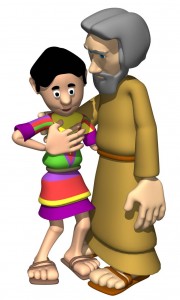 May the following study strengthen your faith in Yeshua, in his divine origination in the very heart, mind and essence of Elohim, and in the fact that he was foreordained to come to this earth to reconcile sinful man to his Heavenly Father through his self-sacrifice on the cross. All this was prophesied long ago in the Hebrew Scriptures. The ancient Jewish rabbis speak of a messianic figure coming called Messiah ben Yosef, the Suffering Servant, whose life and ministry would parallel that of Joseph, yet these same rabbis fail to see the connection between Joseph’s life and that of Yeshua. Let’s now chronicle the striking and uncanny parallels between Joseph and Messiah, the son of Joseph, the Suffering Servant (Many of these comparisons come from the book, Gleanings in Genesis, by Arthur W. Pink):
May the following study strengthen your faith in Yeshua, in his divine origination in the very heart, mind and essence of Elohim, and in the fact that he was foreordained to come to this earth to reconcile sinful man to his Heavenly Father through his self-sacrifice on the cross. All this was prophesied long ago in the Hebrew Scriptures. The ancient Jewish rabbis speak of a messianic figure coming called Messiah ben Yosef, the Suffering Servant, whose life and ministry would parallel that of Joseph, yet these same rabbis fail to see the connection between Joseph’s life and that of Yeshua. Let’s now chronicle the striking and uncanny parallels between Joseph and Messiah, the son of Joseph, the Suffering Servant (Many of these comparisons come from the book, Gleanings in Genesis, by Arthur W. Pink):
- Joseph had two names: Yoseph (meaning “to add, increase, do again”) and Zaphnath-panaaneah (41:45) (meaning “revealer of secrets”). How do these names point to Yeshua’s mission? Continue reading
Prophetic Shadows in Joseph’s Life (pt 4)
This final post in this series on the life of Joseph is a little longer than the others, but stay with it to the end. It’ll be worth the time to read it in that your understanding of end-times prophecy with regard to the Jewish and Christian people will be greatly expanded. Enjoy!
Joseph’s Brothers Didn’t Recognize Him as Their Brother (Gen 42:6, 8)
Joseph’s brothers did not recognize him, though he recognized them. This is prophetic of what would happen between the brothers in the future—they again wouldn’t recognize each other.
To understand how this scenario would play out prophetically, we have to know who Joseph’s descendants would become. Ephraim and Manasseh, Joseph’s sons (Gen 41:50–52) would not only become whole nations or people-groups, but would become the leaders of other nations as well (see Ezek 37:16; Hos 6:10; 11:12; 2 Chr 30:1, 10–11).
Prophetically speaking, as Judah (the leader and spokesman of the brothers and whose descendants are the modern-day Jews didn’t recognize Joseph, so the Jews have not recognized Joseph’s descendants—the house of Ephraim—who constitute a major portion of the lost sheep of the house of Israel today (Matt 10:6; 15:24). The Jewish sages have long recognized that their Ephraimite brothers (along with those from the other tribes who had forgotten their identity) are scattered and will someday return by the divine hand of the Almighty and in fulfillment of numerous biblical prophecies. For example, Jewish teacher Jacob Immanual Schochet acknowledges that through the efforts of the Messiah, the ingathering of the exiles, including the ten tribes of the Northern Kingdom, will occur, and they will be reunited with Judah and together the whole house of Israel will serve YHVH as stated in Ezekiel 20:32–37, 40–42. The Talmud (the Jewish oral law) confirms this view position and states that the ten lost tribes will return to the land of Israel at the end of the age in conjunction with the coming of the Messiah to be reunited with their Jewish brothers.
Joseph’s Brothers Didn’t Recognize Him as Their Savior (Gen 42–44)
Joseph’s brothers didn’t recognize that Joseph was their savior (from famine). Prophetically, and in our time, most Jews neither recognize Christians (the descendants of Ephraim and Manasseh) as their brothers, nor that the Jesus of Christianity is their Savior who will supply spiritual food for which their hearts are longing (but not finding in rabbinical Judaism), but that he died to redeem them from their sins.
The Scriptures prophecy that this spiritual blindness would occur to many of the children of Israel, including the Jews. We read about this in Isaiah 8:14 and Romans 11:25.
The Concept of Deliverance Through Substitution (Gen 42:17–19, 24)
Joseph made known to his brothers a way of deliverance through substitution in that they would all be saved if Simeon were held back for ransom.
Continuing our comparison between Joseph and Yeshua, Continue reading


